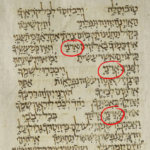
Nehemia Gordon is the most influential contemporary arguer for the pronunciation Yəhōvâ. In his opinion, the form יְהוָֹה represents the original vocalization of the Tetragrammaton, and the Masoretic scribes removed the cholam (the long vowel ō, written as a dot the top left of a letter in the Tiberian pointing system [like ◌ֹ, in which ◌ represents any Hebrew letter]) in order to change the vocalization enough to remind people that they aren’t supposed to be pronouncing the Name aloud. The dropping of the cholam from the name serves to make the name unpronounceable (ineffible), serving as a visual reminder to the reader not to pronounce the name as it is written when reading aloud—and concealing the full pronunciation from the eye of the reader.
This is partially true on the face of it. The cholam has been removed as a reminder that this name is extremely sacred and that the reader should elevate her thoughts when reading the name (whether she pronounces it aloud or only in her mind). But there is more to it than what we are led to believe, and the purpose of the Masoretes in removing the cholam was not to hide the pronunciation Yəhōvâ from our eyes. Indeed, it is not the name יהוה that the Masoretes altered in the first place. The Tetragrammaton simply received this alteration on the basis of its copying the vowels from אֲדֹנָי as a qere perpetuum, as discussed in another part of this presentation. Rather, the name אֲדֹנָי is where it began. There are about 435 instances of the word אֲדֹנָי ʾăḏōnāy in the Hebrew Bible that refer to God, of which 371 are extant in the Aleppo Codex. The Masoretes did two things to remind us that these are referring to God and that we must elevate our thinking when we encounter them: (1) they changed the normal first-person personal suffix from patach to qamats (going from אֲדֹנַי to אֲדֹנָי); and, (2) they removed the cholam from the word (going finally from אֲדֹנָי to אֲדנָי). If you check the Aleppo Codex, you will see that 97% of extant instances of the word are missing the cholam, in the same way that the name יְהוָה is missing the cholam.
Mr. Gordon has yet to address the fact that the cholam is missing not only from the Tetragrammaton in the Masoretic Bible, but also from אֲדֹנָי (consistently in the Aleppo Codex) and from יְהוִה (consistently in the Leningrad Codex, whereas the Aleppo Codex leaves the cholam on יְהוִֹה in all instances [since it never removes it from אֱלֹהִים ʾĕlōhîm]). We find in 97% of extant instances of אֲדֹנָי ʾăḏōnāy (not אֲדֹנַי ʾăḏōnay) in the Aleppo Codex that the name is written as אֲדנָי (missing the cholam). This seems really odd, and we must understand why this happens to understand why the Tetragrammaton is also missing the same cholam.
Vocalizations of אדני in Biblical Hebrew
The word אדני (alef-dalet-nun-yod) can be pointed (vocalized) three different ways in Hebrew. First, it can be from the singular form אָדוֹן ʾāḏōn “lord” with a first-person singular personal suffix, looking like אֲדֹנִי ʾăḏōnî and meaning “my lord.” Second, it can be from the plural form אֲדֹנִים ʾăḏōnîm “lords” with a first-person singular personal suffix, looking like אֲדֹנַי ʾăḏōnay (with a short a [patach] in the last syllable) and meaning “my lords.” Third, it can be from the plural form of אֲדֹנִים ʾăḏōnîm “lords” used as a plural of majesty, with an altered first-person singular personal suffix, looking like אֲדֹנָי ʾăḏōnāy (with a long ā [qamats] in the last syllable).
The form אֲדֹנָי (with the qamats) is reserved for referring to God. Gesenius says, under the entry אָדוֹן, that “the lengthened form םָ has been put by the grammarians, so as to distinguish it from אֲדֹנַי ‘my lords,’” even though both forms are pronounced the same.
Significance of a “Full Vowel Set”
As of September 2019, Nehemia Gordon and his group of text searchers had found that in 86% of the manuscripts that they had investigated, the name יהוה appeared in all instances (apparently) without the vowel cholam (i.e., as יְהוָה rather than as the anticipated יְהוָֹה). He doesn’t mean that the cholam is found in 14% of instances of the Name, but only that 14% of the examined manuscripts have at least one instance of the Name with the “full set of vowels.”